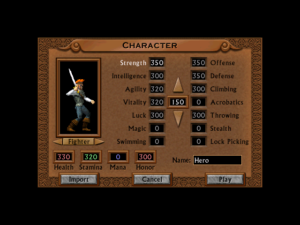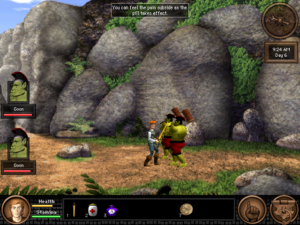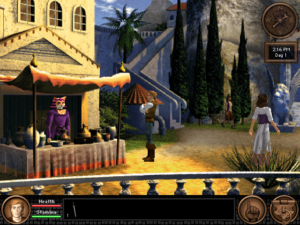I think it was Gardner Fox, famous golden-and-silver-age comics writer, who illustrated the varying narrative challenges of the different titles he worked on by hypothetically putting Johnny Quest and The Flash in the same situation: they’re told that there’s a time bomb somewhere in the city and there’s only so much time to find it and do something about it. For Johnny Quest, the challenge for the writer is coming up with a plausible way for the hero to overcome the natural obstacles presented by the situation. After all, Johnny can’t search the entire city by himself; he needs some kind of clue about where to start, and probably the help of the police, and why would they believe some kid with a crazy story? The author has to invent details that help the hero along.
The Flash, on the other hand, can search the entire city by himself, and once he finds the bomb, can carry it off to the middle of the desert so it doesn’t hurt anyone. The time limit is irrelevant to him. Things in general are easy for The Flash. The writer’s challenge is coming up with reasons why the task isn’t trivial.
This is more or less the difference between the Fighter and Wizard classes in Quest for Glory V. Back in QfG1, things were more or less balanced. But as you play through the series, the player character has to become more powerful. And, while the Figher becomes more powerful by becoming more effective at the one thing he does, the Wizard becomes more powerful by learning more spells, which is to say, gaining more options. After four games of expanding repertoire, I find it difficult to even keep track of all the spells I start with, let alone the new ones. So how do you make situations that are challenging to someone who can levitate, turn invisible, and manipulate objects at a distance?
One way that QfG5 does it is through the profound cheapness we call anti-magic fields. But that seems to only be in effect in certain places within city limits. Another way is by impeding travel: one spell you don’t have is Teleport. This is a major part of the game’s overall structure: Silmaria is a group of islands, much too far apart to levitate between. You can hire a boat, but the boats won’t go where it’s unsafe. As you beat back the baddies, the safe area expands, but sometimes you have to find your own way to places the boats won’t go yet.
There’s one other way one might call the Wizard class overpowered: the stats. I said earlier that the player character becomes more powerful over the course of the series. Unlike most CRPGs, the Quest for Glory games don’t reset you to a low level at the beginning of every game. Instead, they scale everything else up. In QfG1, the maximum value for every stat and skill was 100; in QfG2 it was 200, and so on. So if you max out your skills every game, the events of QfG2 make you twice as able as you were, but those of QfG5 only increase your skills by a quarter — or is the scale logarithmic? At any rate, if you start QfG5 as a Wizard, your minimum Strength is already 200, in theory making you twice as strong as the ablest fighters in QfG1 and probably capable of punching out the minotaur there, the game’s toughest monster, without breaking a sweat. This, however, is demonstably false, because that very same minotaur is a major NPC in QfG5, having accompanied Elsa von Spielburg to Silmaria. (After all, how could she leave him behind? Pseudo-Greece is his homeland. He’s guildmaster at the Silmaria Adventurer’s Guild now.) You can duel him in the arena, and while he isn’t the toughest monster in the game this time, he’s no slouch. Persumably he’s been working out as much as the hero since their last encounter. Or, to rationalize less, the numbers are as arbitrary as power levels in Dragonball Z, and only meaningful within a very local context.
Anyway, it’s fun playing an overpowered character now and then. Heck, there are entire genres of game based on it. And the QfG system gives the player a good deal of latitude about how to apply that power: you can practice Flame Dart and Lightning Ball to become a combat mage, or you can practice Calm and Dazzle and Hide to become an avoiding-combat mage. Some players like to create their Thief characters with skill in magic for the advantages it gives to stealth, but I’ve been a purist about that.
However you play it, since this is the last game of the series, the hero is by now a master of the craft. There’s one small point that I really liked as a way of illustrating this. In every game, you get to learn new spells from other, more powerful mages; in the first two games, there were magic shops selling spells to anyone with cash, but in the third and fourth episodes you had to seek out special teachers, including the legendary Baba Yaga (last seen as the prime antagonist in QfG1). Well, in QfG5 there’s a magic shop again, and for the first time, there are spells that you know that the shop proprietor doesn’t. And he’s willing to pay you for them.
 Comments(0)
Comments(0)


